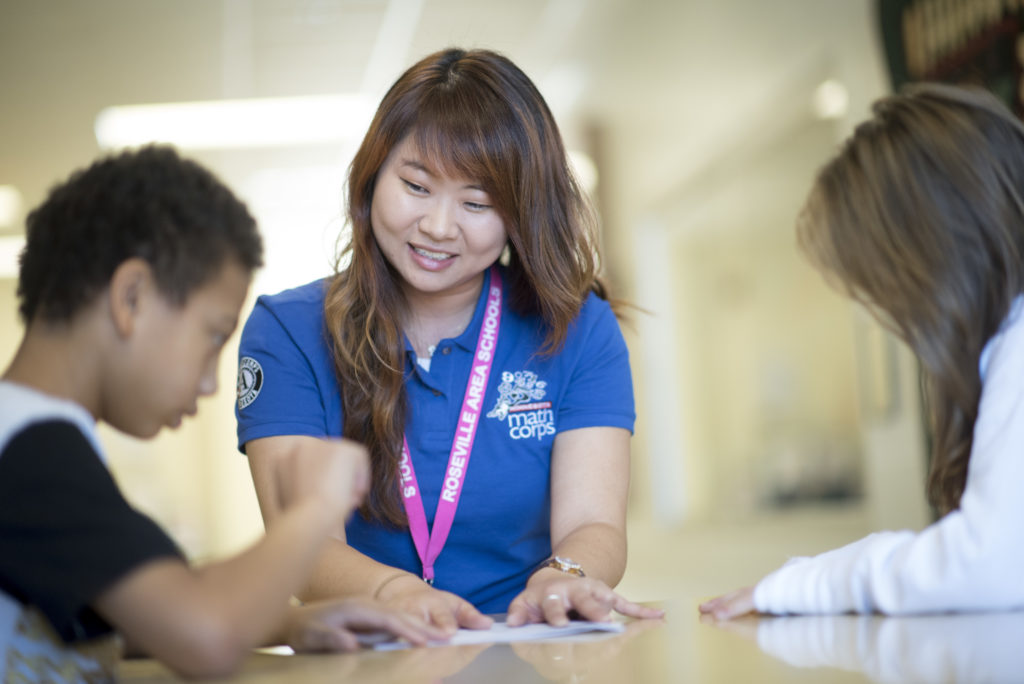The results of last year’s Minnesota Comprehensive Assessments (MCA) for grades 3-11 just came in, and the results are dampening some of the state’s back-to-school spirit.
Many districts reported a decrease in student math scores, with scores state-wide declining for the fourth year in a row with only 53.9 percent of students meeting or exceeding standards for math proficiency. And gaps for students of color, English Learners and low income students are not closing.
The MCAs are state assessments in reading, mathematics and science that are used to meet federal and state legislative requirements. The tests are administered every year to measure student performance relative to the Minnesota Academic Standards that specify what students in a particular grade should know and be able to do.
Math Corps: An Evidence-Based Solution With Bi-Partisan Support
State leaders recommend targeting resources on proven strategies to help students accelerate their growth in math. One such strategy, which has been implemented in schools across the state already, is Minnesota Math Corps.
Two Minnesota State Legislators proposed bi-partisan legislation calling for investing more in math education through the implementation of Math Corps this past session. The Math Corps model pairs tutors from AmeriCorps who are trained and work alongside teachers to support students in grades 4-8 needing a little extra help to improve their foundational math skills.
Senator Paul Anderson, a Republican from Minnesota’s 44th District, sponsored legislation in the Minnesota State Senate to increase funding for Minnesota Math Corps in 2019. In a recent Star Tribune Op-Ed co-authored with State Representative Amy Wazlawik, a Democrat from District 38B, Anderson wrote:
“This past session, we co-authored bi-partisan legislation to expand an evidence based approach to improve students’ foundational math skills. Minnesota Math Corps, an AmeriCorps program serving schools across the state, works with students below grade level in mathematics to build their foundational math skills in such areas as numeracy and proportional thinking,” he wrote. “These skills are essential for later success in algebra and statistics.”
Wazliwak reinforced that Math Corps provides an opportunity for schools to help address the decline in math skills.
“When we look at our test scores for math, we see there’s a need for additional improvement in those scores and Math Corps is one way to reach those students who are most at-risk, help provide them with additional support to help them with their math skills,” said Wazliwak, in her testimony this past spring. “The earlier we can catch students, the faster we can get them back on track.”
Math Skills’ Relation to Graduation and STEM Careers
Research shows that math skills are highly predictive of high school graduation, and math skills will help students beyond graduation.
“It’s critical for our students to succeed in algebra. Math Corps is a key partner in ensuring all students are ready for advanced math courses and STEM careers,” said Dr. Mike McCollor, the recently-retired former principal at Washington Technology Magnet School in St. Paul. “Our Math Corps students average twice the growth of other students.”
In 2017-18, 66 percent of Math Corps students exceeded growth expectations on the MCA, and 92% of school partners (including principals) agree that participation in Math Corps had a positive impact on their students.
An Investment in PreK Math Will Help
Additionally, Reading & Math, Inc., which oversees and implements Math Corps and Reading Corps, among other AmeriCorps programs, is developing interventions for students in grades K-3 and have launched an early math toolkit for PreK instructors. Data shows that the earlier Math Corps interventions are implemented, the quicker students can reach grade level.
Sarah Moline, Director of Eden Prairie Early Childhood, which participated in a PreK program in 2018-19, said recently that the confidence that students get after Math Corps at that young age is evident.
“We’re hearing more and more of our students labeling themselves – “Look! I’m a mathematician!” And they’re so proud of themselves when they have that label of themselves. I credit (the program) for giving them that confidence boost,” she said. “They can explain their thinking as well.”
The Tutor-Student Model
Math Corps tutors are AmeriCorps members who receive intensive training and ongoing coaching to learn how to deliver Math Corps lessons and use assessment tools. The tutors themselves are passionate about giving back to their communities and helping schools and students. In their daily sessions, Math Corps tutors spend 30 minutes with pairs of students per student and help with basic math skills but also provide positive reinforcement for students.
Ferdinand Schlapper, a Math Corps tutor at Woodbury Elementary School, acknowledges the importance of this focused, positive attention for students.
“A lot of them have already heard the message that if you’re not good at math, you’re never going to be good at math, and so the opportunity to have this individualized instruction all of a sudden helps the light go off,” he said.
And students want to feel successful at math. Chuck Mantha, a Math Corps tutor at Cherry Hill Elementary School in Lakeville said that when he goes to get his Math Corps students from their classrooms, other students now ask if they can come along.
“When that started happening, it was the neatest thing because they could see how the Math Corps students were improving and succeeding and they wanted that, too,” he said in a recent ServeMinnesota blog post. It was a great feeling to realize I’d become a mentor and a partner for my Math Corps students.”
Learn more about Minnesota Math Corps, one of ServeMinnesota’s AmeriCorps partners.




